After the 2016 US-presidential election and Brexit referendum, fake news emerged as a quintessential democratic problem that media literacy was tasked to solve. The broad social concern about fake news acknowledges that the public sphere is a kind of commons that requires tending, and reminds us of the human (and civic) need for authenticity, honesty, clarity, and fairness in our shared discourses. In light of the perceived danger to democracy that fake news embodies, increasingly media literacy is seen as fundamentally about cultivating civic engagement skills. In addition to improving the news and information ecosystem of social media, media literacy promotes critical thinking skills and fundamental research techniques to distinguish legitimate and authentic information from propaganda, disinformation, hoaxes, lies, and blatant manipulation.
Continue Reading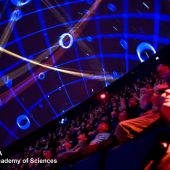
Bella Gaia (Beautiful Earth) is a performance that combines a world-music inspired soundtrack with projected graphics, animations and video to educate about climate change. A hybrid of art and science, the nonlinear performance is an example of an emerging form of ecomedia in which remote sensing media are used to transform audiences to experience Earth as an organic, living organism. Bella Gaia’s creative director and creator, Kenji Williams, discusses this new form of educational experience. The violinist, composer and filmmaker incorporates a neuro-science driven methodology to create “immersive live theater, mixed reality, and interactive data visualization.”
Continue Reading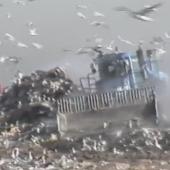
While teaching about climate change in K-12 schools often focuses on the catastrophic crises it is causing on a global scale, for students from poor and historically marginalized communities a pedagogy of environmental justice centers their own local neighborhoods, schools, and homes as sites for investigation and action. The Educational Video Center (EVC) in New York City has practiced this critical pedagogy for over 30 years developing students’ media literacy and civic engagement as they learn to question and bear witness to the toxic environmental conditions in their communities. Links to EVC student produced documentaries spanning three decades chronicle the impact of garbage landfills in the ground, sanitation truck fumes in the air, lead dust and black mold in the walls of their public housing apartments. Through these inquiries, students learn how such environmental pollution is linked to disproportionately high rates of lead poisoning and chronic asthma among low income communities of color. As a form of participatory action research, they not only learn to use the power of media to educate the public about the inequitable policies that produce these environmental and public health crises. They also use their videos to make a call to action for greater accountability and sustainable environmental justice.
Continue Reading
As education increasingly emphasizes science, technology, engineering and math (STEM), many media educators may choose to promote skills-based technology curricula as a substitute for critical forms of media literacy. This poses a challenge for media educators who are trying to incorporate environmental issues into their pedagogical practice. As a website designer, I have wondered how my work contributes to the climate crisis, and more important, if there’s anything I can do to reduce the carbon footprint of the websites I create. What I’ve learned not only shows me how I can create more eco-friendly websites, it also suggests how educators can encourage students to investigate the environmental impact of new media technology while they learn technological skills. Since media production is an important component of teaching media, media educators often create their own web-based projects or assign them to their students. These can become ecomedia literacy projects by 1) investigating the environmental impact of websites, 2) using critical media literacy skills to verify environmental claims made by tech companies, and 3) learning and implementing best practices of sustainable web design to minimize the carbon emissions associated with student and faculty websites. At the very least, students can be challenged to evaluate the environmental footprint of their web-based projects.
Continue Reading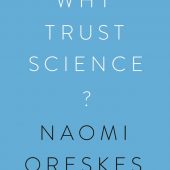
In her latest book, Why Trust Science?, history of science professor Naomi Oreskes does a wonderful job discussing the complexity of this question. She takes a difficult task and rather than simplify it, she dives deep into an exploration of the historical and philosophical roots and traditions of Western science, taking the reader along an analysis of case studies where science got it wrong. This is a fascinating and accessible read that considers numerous domains and issues to bring the reader to Oreskes’ ultimate point, that trustworthy science depends on consensus, diversity, and methodological openness and flexibility (p. 249). For media literacy educators, this book provides insightful examples of media representations of science with a powerful critique of the myth of objectivity and the value of trustworthy science.
Continue ReadingI propose in this essay that a key to rebalancing life systems now being harmed by human activity requires a return to the priority of “truthfulness” as practiced by traditional Indigenous cultures for whom words are sacred vibrations of energy, requiring close attention to how one describes reality as truthfully and holistically as possible. This contrasts with the use of deceptive language common today. Furthermore, because words have the power to hypnotize self and others, awareness of trance-based learning is vital for helping assure one’s beliefs are not based on untruthful sources. I assert that there is no better way to explain how intelligent people can destroy or allow for the destruction of ecosystems without referring to unconscious acceptance of misguided hypnotic directives. Uncritical hypersuggestibility relates to the rise of fear-based living, authoritarianism and deceptive hypntoic language that has been cultivated under the dominant worldview. A solution is to return to awareness and intentional use of trance-based learning for maintaining or re-establishing healthy, reality-based ways of being in the world such as humans did well for most of human history.
Continue ReadingIn the spring of 2017, a conservative think tank mailed 300,000 copies of a book to US teachers and college faculty to encourage widespread uncertainty about climate change and promote neoliberal, free enterprise discourse in US schools. Teachers have been targets of free enterprise propaganda campaigns throughout the last century. This most recent event stresses the need for critical media literacy in teacher preparation programs and throughout the US education system. From an EcoJustice Education perspective, this paper demonstrates how to perform a cultural-ecological propaganda analysis to assess the power-knowledge relations that circulate within a text’s discourse. A Foucauldian approach to discourse analysis allows readers to draw conclusions about texts without requiring background information about the texts’ authors. Even when information about an author is available, as it was in this case, grounding evidence of intent and effect within the discourse itself strengthens conclusions by challenging the author’s arguments rather than the author’s self. Along with an overview of common propaganda techniques, a thematic analysis identifies the main messages of the text and a rhetorical analysis explains how the messages are delivered and to what effect. Rhetorical devices, fallacies, contradictions, formatting, and hierarchized thinking are deconstructed to highlight flaws in the logic and reasoning of arguments. Educators must find opportunities to disrupt dominant discourses that perpetuate the unsustainable model of free enterprise and reconstruct community from an ecologically sustainable perspective. Humanity can no longer afford to prioritize fiscal economy over ecology. This paper concludes by sharing an alternative resource that educators can use in preparation for teaching about global warming and climate change. The two guides offer opposite lenses for understanding global warming and could be used in classroom activities with students as sample texts for critical analysis.
Continue Reading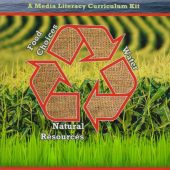
This article explores how teachers can integrate the theory and practice of media literacy education into the teaching of sustainability content. It highlights two lessons, one for elementary students on bottled water choices and one for high school students on climate change and agriculture, detailing lesson construction and execution. The article explains how praxis, the intersection of reflection and action, can be brought to life in classroom settings using contemporary media documents as codes to deepen understanding and to initiate involvement for change.
Continue Reading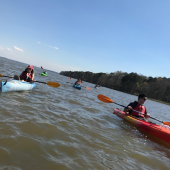
This essay describes a series of interdisciplinary projects addressing environmental issues in Florida where faculty and students from different departments collaborate on complex problems and produce multimedia work aimed at reaching a public audience. Through a series of brief case studies, a model of interdisciplinary experiential education emerges, providing a pathway forward for other faculty to create community engaged projects that have real world impacts.
Continue Reading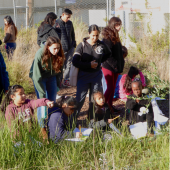
This essay explores the role of critical pedagogy in environmental justice education. We discuss the need for teaching a love of nature (biophilia) as an entry point for developing a caring relationship and sense of stewardship with the natural world. Place-based education and ecopedagogy offer liberatory potential to make education more transformative and focused on the intersections between social and environmental justice. After discussing theoretical approaches of ecopedagogy and indigenous perspectives, we describe a project in which a principal converts the hardscape at two schools into natural habitats and a new teacher engages her students in ecopedagogy.
Continue Reading
Held near Siena, Italy, our 3-week summer abroad program, The Mindful Palette of Stonehill College, combines art, gastronomy, and agricultural studies that strive for cultural mindfulness through holistic and experiential learning processes. A strong belief in sustainability, both philosophically and praxis, underlie these unique experiences. We share the complexities of attaining a sense of mindfulness with modern expectations and preconceptions. We address strategies to convince and support students to not only taste-test but to learn and embrace another culture and the environment through interdisciplinary activities and media formats. Through immersive and hands-on learning, we explore the intersections of food culture and the arts, so that students gain a comprehensive understanding of the impact of the handmade and the value of personal labor. A nose-to-tail mindset defines how and what materials we use. Until the modern era, art-making, food preparation, and scientific experiments were born out of the kitchen, both as laboratory and studio. The hearth was also the heart of the home—and therefore defined the family and cultural identity. Artistic practices that begin with the origins of our resources and have connections to the kitchen fortify our lessons and touch upon many of the aspects we find most important in the act of mindful learning—awareness of the self and the other, and our material’s origins and potential uses. They result in seeing how the daily and divine are one and the same.
Continue Reading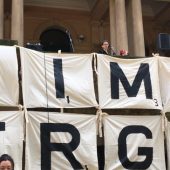
Transformative sustainable pedagogy and public intellectual work share the same aims and guideposts, including upholding higher education’s foundational intentions of fostering moral character in tomorrow’s leaders. Radical modes of sustainable education, including regenerative pedagogy, which tends to the global shift to restore, respect, and regenerate ecological and societal balance, and inside-out pedagogy, which helps learners take their inner seeds, sprouts, and blossoms of good ecocultural intentions to stages of external fruition, speak both to educating learners and engaging the public. If pedagogues aim to encourage students to put beliefs into action and be leading voices in ethically addressing today’s pressing environment and society problems, this may require role modeling by having the courage to do so themselves. In these contexts, the author relates her own experiences speaking for Extinction Rebellion as an illustration of expanding notions of what it means to be a sustainability educator today.
Continue Reading